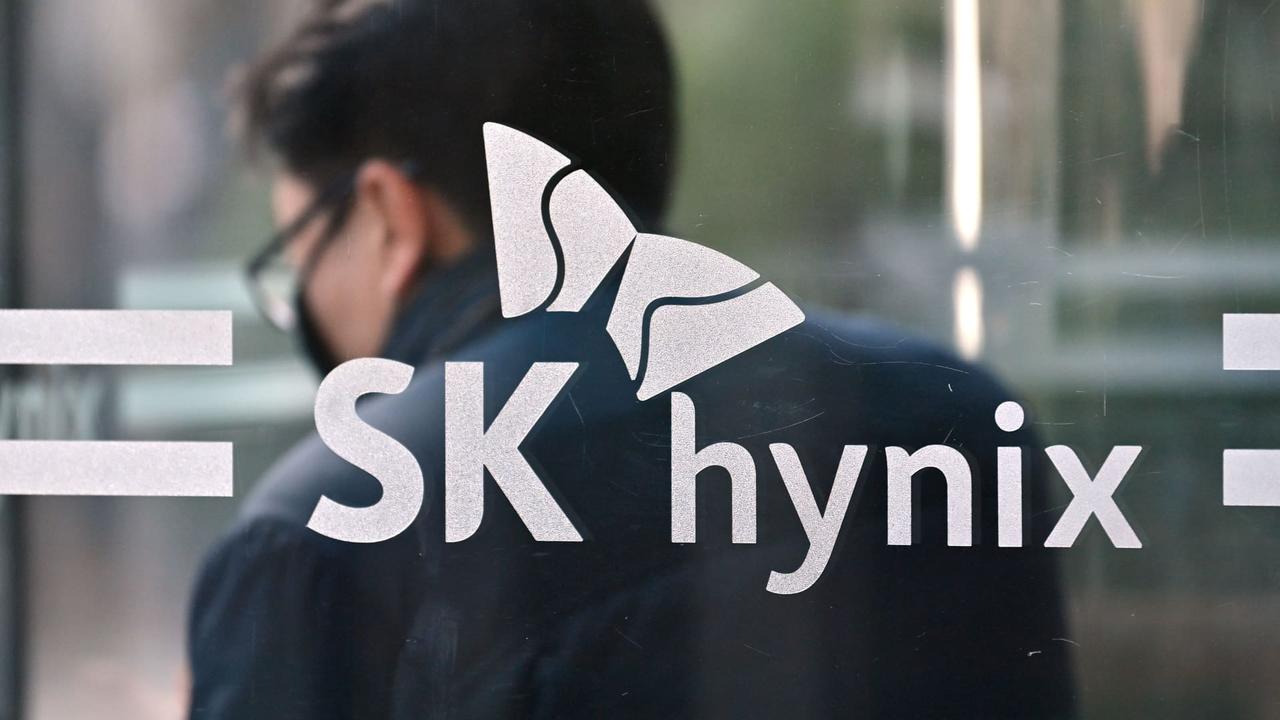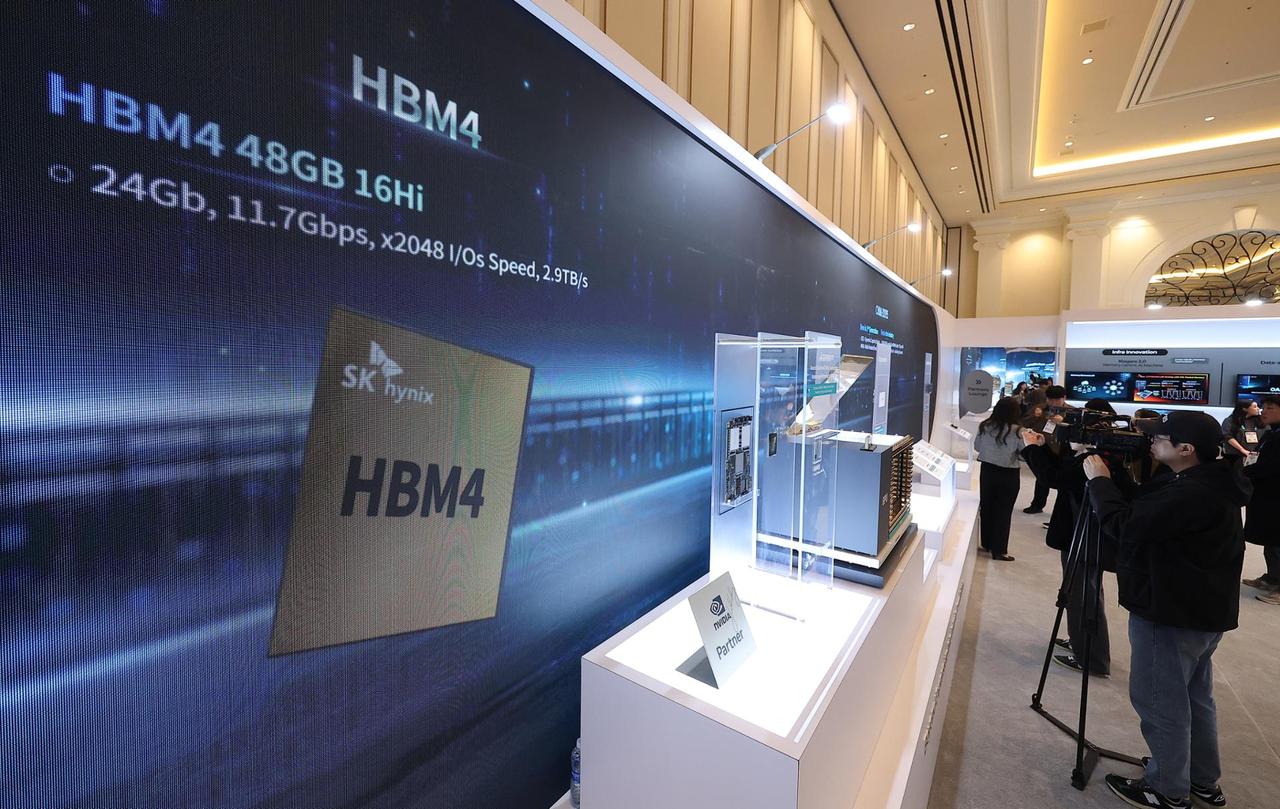SK Hynix Leads AI Memory Race with HBM4 Breakthrough
6 Sources
6 Sources
[1]
SK Hynix Shares Hit Record With News of AI Memory Milestone
SK Hynix Inc.'s stock climbed as much as 5.9% on Friday to a record after the company announced it had completed development of HBM4, the next generation of high-bandwidth memory crucial for artificial intelligence work. The Seoul-traded chipmaker, whose shares are up roughly 90% over the past year, is now worth close to $170 billion. The company's stock was on an eight-day winning streak ahead of the announcement, as bullish AI sentiment lifted key supply chain players. SK Hynix is the go-to HBM provider for Nvidia Corp., surpassing much bigger rival Samsung Electronics Co. to secure a lead in this advanced technology.
[2]
SK Hynix extends lead in high-bandwidth segment as it readies production for next-gen memory chips
A man walks past a logo of SK Hynix at the lobby of the company's Bundang office in Seongnam on January 29, 2021. South Korean memory chipmaker SK Hynix said Friday that it was ready for mass producing its next-generation high-bandwidth memory chips, staying ahead of rivals, and sending the company's stock soaring. HBM is a type of memory that is used in chipsets for artificial-intelligence computing, including in chips from global AI giant Nvidia -- a major client of SK Hynix. SK Hynix said earlier this year that it had shipped samples of its HBM4 chips to customers, as it sought to beat competitors including Samsung Electronics and Micron Technologies. According to its announcement Friday, the company has finished its internal validation and quality assurance process for HBM4 and is ready to manufacture those at scale. "Completion of HBM4 development will be a new milestone for the industry," Joohwan Cho, head of HBM development at SK Hynix, said. HBM4 is the sixth generation of HBM technology -- a type of Dynamic Random Access Memory, or DRAM. DRAM can be found in personal computers, workstations and servers and is used to store data and program code. SK Hynix's latest HBM4 product has doubled bandwidth and increased power efficiency by 40% compared to the previous generation, according to the company. Notably, HBM4 is expected to be the main AI memory chip needed for Nvidia's next-generation Rubin architecture -- a more powerful AI chip for global data centers -- said Dan Nystedt, vice-president at TriOrient, an Asia-based private investment firm with a focus on semiconductors. "SK Hynix is a key supplier for Nvidia, and the announcement shows it remains far ahead of rivals," he said. Samsung Electronics and Micron have struggled to catch up to SK Hynix in HBM, as it builds on its segment leadership and benefits from being Nvidia's main HBM supplier. Micron has also shipped samples of its HBM4 products to customers, while Samsung has reportedly been working to get its HBM4 chips certified by Nvidia. However, analysts expect SK Hynix's dominance to persist into next year. This company's shares rose more than 7% Friday to hit their highest since 2000, following its chip announcement, bringing year-to-date to nearly 90%. Shares of Samsung Electronics and Micron have risen over 40% and nearly 80% in 2025, respectively. SK Hynix posted record operating profit and revenue for its June-quarter, thanks to strong HBM demand, which accounted for 77% of its overall revenues. The company expects to double HBM sales for the full year compared to 2024, and for demand from AI to continue to grow into 2026.
[3]
SK hynix edges out rivals with first-to-market HBM4 chips for Nvidia and others
Serving tech enthusiasts for over 25 years. TechSpot means tech analysis and advice you can trust. What just happened? SK hynix is preparing to begin mass production of its HBM4 chips, marking a major step forward in memory technology tailored for artificial intelligence. The South Korean company has completed its internal review and developed faster, more energy-efficient memory that meets rising industry demand. As global AI adoption accelerates, the need for high-speed, power-efficient components to support the expanding data center market continues to grow. HBM4 is the sixth generation of SK hynix's high-bandwidth memory, a DRAM-based technology built for rapid data processing in advanced computing environments. According to the company, the new chips double the available bandwidth compared with previous HBM products by using 2,048 input/output terminals, a significant increase that enables much faster data transfer. Power efficiency has also been improved by more than 40 percent, addressing growing data-center operator concerns about energy costs as AI workloads proliferate. The new memory modules exceed industry benchmarks, reaching operating speeds above 10 Gbps - well ahead of the JEDEC standard of 8 Gbps. Manufacturing leverages the Advanced MR-MUF process and SK hynix's fifth-generation 10-nanometer node, reducing production risk at large scale. SK hynix's latest move positions it ahead of major competitors, including Samsung Electronics and Micron Technology, both of which have announced progress on their own HBM4 products this year. While Samsung has shifted to a 4-nanometer manufacturing process and Micron has begun shipping samples to select customers, analysts expect SK hynix to capture significant market share thanks to its early delivery of 12-layer HBM4 modules. The company remains a key supplier for Nvidia, which is expected to integrate HBM4 into its upcoming Rubin architecture for next-generation AI data centers. Industry observers view SK hynix's first-mover advantage as pivotal. Meritz Securities analyst Kim Sunwoo projects the company's HBM market share will remain in the low 60 percent range by 2026, supported by sustained demand and leadership in advanced memory. Counterpoint Research anticipates SK hynix may hold roughly half of the growing HBM market as competitors continue to refine and certify their newest chips. SK hynix shares jumped more than seven percent on the announcement, reaching their highest level since 2000 and contributing to year-to-date stock gains of nearly 90 percent. The company posted record sales and operating profit in the June quarter, with high-bandwidth memory accounting for 77 percent of revenue and boosting its market capitalization by more than $80 billion since the start of the year. Looking ahead, SK hynix forecasts its HBM sales will double this year compared to 2024, with further AI-driven demand growth expected through 2026.
[4]
SK Hynix shares hit record high on AI memory development milestone By Investing.com
Investing.com-- Shares of SK Hynix Inc (KS:000660) climbed to a record high on Friday after the South Korean chipmaker said it had completed development of its next-generation high-bandwidth memory, known as HBM4, a key component for artificial intelligence applications. The South Korean chipmaker said HBM4 will deliver roughly double the bandwidth of the previous generation and more than 40% improved power efficiency, aided by the adoption of 2,048 input-output terminals. SK Hynix said it has completed preparations for mass production of HBM4. It added that the product has achieved operating speeds above 10 gigabits per second, surpassing the 8 Gbps industry standard set by JEDEC(Joint Electron Device Engineering Council). The company expects the new memory to improve AI service performance by as much as 69% while reducing power costs for data centres, where electricity demand is becoming a key concern. Seoul-listed shares of the company jumped nearly 6% to hit a record high of 326,000 won by 01:37 GMT. The stock has been on a tear in the past few sessions amid renewed AI optimism, and was set to jump nearly 20% for the week.
[5]
The memory chip war is heating up the markets
Last July, we discussed the 20 companies best positioned to meet the needs of artificial intelligence. Amongst them were Samsung, SK Hynix, and Micron, the three major players in High Bandwidth Memory (HBM) 4 technology. If you would like to learn more about the technical details, our previous paper is dedicated to this topic, but one thing is certain: the market has decided to turn en masse to this technology. As a result, the shares of these three manufacturers have performed remarkably well in recent days. SK Hynix and Micron are currently at their respective all-time highs, while Samsung Electronics, after a more subdued phase, is back on a solid upward trajectory. However, not all of them will emerge victorious: there will be one undisputed leader, and the question is who will take the lead. For now, SK Hynix and Samsung have both announced successful tests of their chips with Nvidia, with very encouraging results in terms of speed. SK Hynix has a major advantage: it has been Nvidia's official supplier since 2018. But Samsung, for the first time, appears to have potentially more advanced technology, according to William Beavington, a well-known semiconductor analyst at Jefferies. Micron, on the other hand, appears to be lagging behind from a technological standpoint. The American manufacturer is focusing primarily on energy efficiency, a choice that is praised in theory but which, according to analysts, comes up against a reality: speed and efficiency have a negative correlation. As a result, Micron's offering appears less attractive for meeting the immediate needs of AI.
[6]
SK Hynix Stock Hits Record After Next-Gen Chip Breakthrough
Shares of Nvidia supplier SK Hynix hit a record high, after the South Korean company said it is ready to mass-produce a new generation of high-bandwidth memory chips. Early Friday, SK Hynix said it has completed the development of the world's first HBM4. The company said it is ready to supply the next-generation memory product for ultra-high performance artificial intelligence to customers. The stock rose as much as 6.5% to touch 327,000 South Korean won a share, equivalent to $235.31. The company's latest achievement will intensify competition among memory-chip makers vying to gain market share in the AI space, which is experiencing increasing demand from companies like Google, Amazon and Meta. On Wednesday, Oracle said it signed several high value AI contracts in the quarter ended Aug. 31 and expects more such deals in the next few months. Chief Executive Safra Catz told analysts that it had signed contracts with three different customers during the quarter. "With recent dramatic increase in AI demand and data processing, the needs for high bandwidth memory for faster system speed are surging," Hynix said. The company expects to improve AI service performance by up to 69% when the product is applied, which will solve the data bottleneck and significantly reduce data-center power costs. "HBM4, a symbolic turning point beyond the AI infrastructure limitations, will be a core product for overcoming technological challenges," said Justin Kim, president and head of AI Infra at SK Hynix. He said that the company will grow into a full-stack AI memory provider by supplying high-quality, diverse memory products that meet the performance requirements of the AI era in a timely manner.
Share
Share
Copy Link
SK Hynix announces completion of HBM4 development, setting a new milestone in AI memory technology. The company's stock soars to record highs as it prepares for mass production, outpacing competitors in the high-stakes AI chip market.
SK Hynix Achieves HBM4 Milestone
SK Hynix, the South Korean memory chipmaker, has announced a significant breakthrough in artificial intelligence (AI) memory technology with the completion of its HBM4 (High-Bandwidth Memory) development
1
. This achievement marks a crucial step forward in meeting the growing demands of AI computing and data centers.
Source: CNBC
Technical Advancements
The new HBM4 chips represent the sixth generation of SK Hynix's high-bandwidth memory technology. According to the company, these chips offer impressive improvements over their predecessors:
- Doubled bandwidth compared to previous generations
- More than 40% improvement in power efficiency
- Operating speeds exceeding 10 Gbps, surpassing the JEDEC standard of 8 Gbps
- Utilization of 2,048 input/output terminals for faster data transfer
2
These advancements are expected to significantly enhance AI service performance, potentially improving it by up to 69% while addressing the growing concern of power consumption in data centers
4
.
Source: Bloomberg
Market Impact and Competition
The announcement has had a substantial impact on SK Hynix's market position:
- Stock price surged by up to 5.9%, reaching a record high
- Company valuation nearing $170 billion
- Year-to-date stock gains of nearly 90%
1
SK Hynix's success in HBM technology has positioned it as a key supplier for Nvidia, the global AI giant. This partnership has been crucial in maintaining SK Hynix's lead over competitors Samsung Electronics and Micron Technologies
2
.Related Stories
Industry Outlook
The race for AI memory supremacy is intensifying:
- Samsung Electronics has reportedly been working to get its HBM4 chips certified by Nvidia
- Micron has shipped samples of its HBM4 products to customers
- Analysts expect SK Hynix to maintain its dominance, projecting a market share in the low 60% range by 2026
3
The demand for HBM in AI applications is expected to continue growing, with SK Hynix forecasting a doubling of its HBM sales in 2025 compared to the previous year
3
.
Source: Market Screener
Future Implications
As AI adoption accelerates globally, the need for high-speed, power-efficient memory components is becoming increasingly critical. SK Hynix's HBM4 breakthrough is poised to play a significant role in shaping the future of AI computing infrastructure, particularly in data centers and advanced AI applications
5
.References
Summarized by
Navi
[2]
[4]
[5]
Related Stories
SK Hynix Accelerates HBM4 Development to Meet Nvidia's Demand, Unveils 16-Layer HBM3E
04 Nov 2024•Technology

SK Hynix Shares Soar as Mass Production of Advanced AI Chips Begins
26 Sept 2024

SK Hynix overtakes Samsung in annual profit as HBM dominance reshapes AI chip rivalry
29 Jan 2026•Business and Economy

Recent Highlights
1
ByteDance Faces Hollywood Backlash After Seedance 2.0 Creates Unauthorized Celebrity Deepfakes
Technology

2
Microsoft AI chief predicts artificial intelligence will automate most white-collar jobs in 18 months
Business and Economy

3
Google reports state-sponsored hackers exploit Gemini AI across all stages of cyberattacks
Technology





